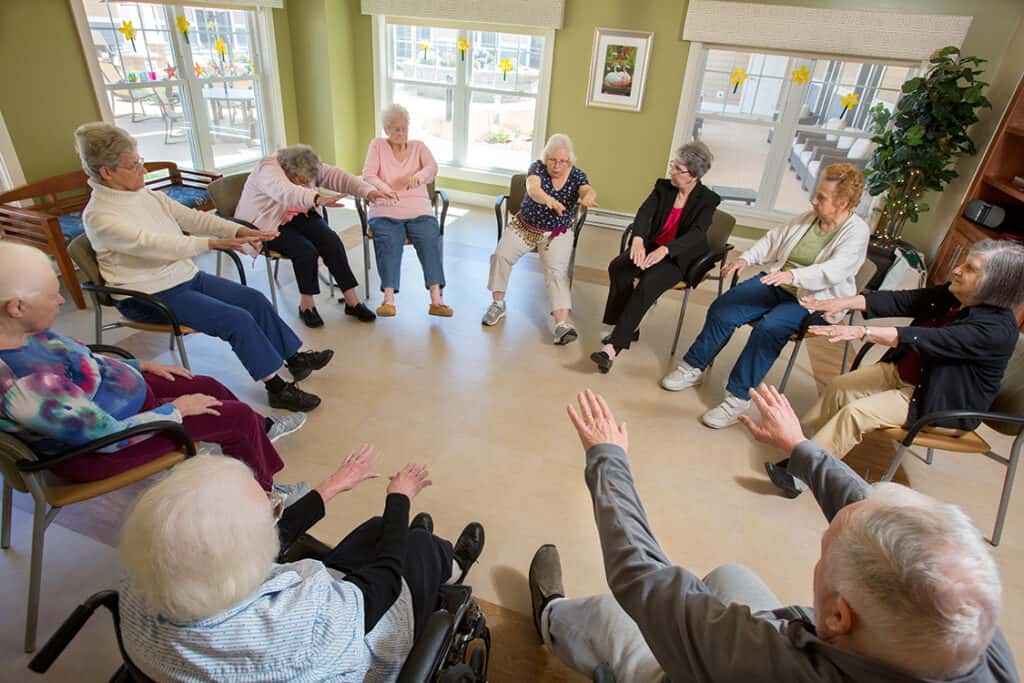Dedicated Memory Care Charlotte: Ensuring Security and Comfort
Dedicated Memory Care Charlotte: Ensuring Security and Comfort
Blog Article
Making the Transition to Helped Living: A Guide for Households
Browsing the change to assisted living can be a complex and emotional journey for families as they seek the finest care and support for their liked ones. With various aspects to consider, from understanding the benefits of assisted living to choosing the appropriate center that straightens with individual demands, families frequently discover themselves at a crossroads of decisions that can impact their loved one's high quality of life.

Comprehending Helped Living Advantages
Comprehending the benefits of assisted living involves taking a look at the thorough treatment and support offered to locals in a caring and specialist environment. Assisted living centers use a series of solutions tailored to fulfill the individual needs of locals. From help with tasks of day-to-day living such as showering, dressing, and medication monitoring to housekeeping, meal preparation, and transport solutions, locals gain from an encouraging area that promotes their independence and health.
One secret benefit of assisted living is the chance for social engagement and communication with peers. Homeowners have actually accessibility to intended activities, getaways, and events that cultivate a sense of neighborhood and combat sensations of isolation. Furthermore, the 24-hour assistance supplied by trained team makes sure that help is always readily available when needed, supplying tranquility of mind to both residents and their families.
In addition, assisted living centers typically have healthcare services on-site or have arrangements with health care companies, guaranteeing punctual medical focus and tracking of homeowners' health problems. This aggressive method to health care monitoring contributes to citizens' overall health and top quality of life in a safe and safe atmosphere.
Assessing Treatment Options and requirements
When considering transitioning to assisted living, an essential step is assessing the care needs and offered alternatives for your enjoyed one. Start by assessing your enjoyed one's day-to-day living tasks, such as showering, dressing, medication monitoring, and dish prep work.
As soon as you have a clear understanding of your liked one's care requirements, check out the different assisted living options readily available. Study facilities that offer the degree of treatment required, whether it's independent living, assisted living, memory treatment, or competent nursing. Think about the place, facilities, staff credentials, and total atmosphere of each facility. Set up visits to potential neighborhoods to see firsthand just how they run and connect with residents.
Consulting with health care specialists, social workers, and financial consultants can provide beneficial insight and guidance in evaluating treatment needs and checking out the best alternatives for your enjoyed one's transition to helped living.
Picking the Right Facility
After assessing your enjoyed one's care needs and exploring the available assisted living options, the following vital action is choosing the most appropriate center for their certain requirements. When selecting the appropriate center, it is important to consider a number of crucial aspects to make sure that your liked one receives the care and support they need.
In addition, analyze the solutions and services used by each facility. Think about factors such as meal alternatives, housekeeping solutions, leisure activities, and transportation availability. Ensure that the center can accommodate your liked one's details clinical and individual care needs, such as drug administration, wheelchair help, and specialized memory care.
Moreover, review the staff-to-resident proportion and the certifications of the caregivers. Adequate staffing degrees and well-trained, compassionate personnel are vital for offering personalized treatment and ensuring your liked one's security and well-being. Ultimately, trip the facilities you are thinking about to get a feel for the setting, tidiness, and overall environment, enabling you to make a notified choice based on direct observations.
Preparing for the Shift
To guarantee a seamless and comfortable change for your loved one right into assisted living, thorough preparation this page and open interaction among all included celebrations are vital. Check out possibility centers with each other to examine their viability and entail your enjoyed one in the decision-making procedure.
Create a thorough moving plan that includes arranging valuables, packing fundamentals, and collaborating logistics. Downsizing may be needed, so include your liked one in deciding what products to keep, give away, or pass on to member of the family.
Interact openly with the personnel at the nursing home about your enjoyed one's routines, needs, and choices. This will help the team provide personalized treatment and assistance from day one. Ultimately, be client and understanding throughout this shift period, as it might take time for your loved one to adapt to their brand-new environment.

Sustaining Psychological Health
Navigating the psychological landscape of moving a loved one to assisted living requires a nuanced approach that prioritizes their wellness and sense of belonging. The change to helped living can evoke a variety of emotions for both the elderly and their member of the family. It is important to recognize and attend to these feelings to ensure a smooth change.
To support psychological wellness throughout this shift, truthful and open interaction is essential. Urge your loved one to share their ideas and feelings concerning the relocation, and pay attention empathetically to their issues. Verify their emotions and supply reassurance that their sensations are normal and easy to understand.
Additionally, maintaining familiar regimens and personal belongings can provide comfort and a sense of connection. Personalizing their living area with cherished items from home can assist develop a acquainted and reassuring atmosphere in their new house.
Lastly, staying gotten in touch with family and friends members, taking part in area tasks, and participating in leisure activities can foster a sense of belonging and social connection, which are important for psychological well-being in assisted living (Senior Assisted Living). By focusing on psychological assistance and understanding, great site family members can aid their enjoyed ones navigate this transition with higher simplicity and durability
Verdict
In verdict, households navigating the change to helped living should thoroughly consider the advantages, examine care requirements, select the ideal center, and get ready for the move. Supporting emotional well-being throughout this process is crucial for an effective transition. By taking these click to investigate actions and focusing on the well-being of their enjoyed ones, households can make sure a positive and smooth change to assisted living.
Browsing the shift to aided living can be a complex and psychological journey for family members as they look for the ideal treatment and support for their enjoyed ones.When taking into consideration transitioning to assisted living, an important step is assessing the treatment needs and readily available options for your enjoyed one.When you have a clear understanding of your loved one's treatment needs, check out the various assisted living choices offered. Charlotte Assisted Living.After evaluating your liked one's treatment needs and checking out the available assisted living alternatives, the following vital action is selecting the most appropriate center for their particular requirements. By taking these steps and prioritizing the health of their liked ones, families can guarantee a positive and smooth transition to aided living
Report this page